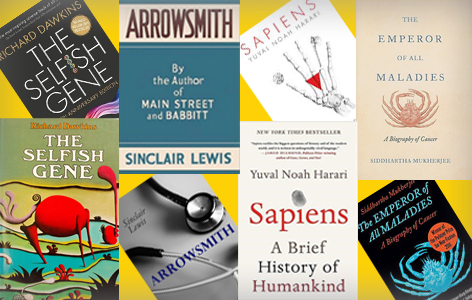
By: Joe Walton, ORT Times Science Writer
To kick off the summer, the ORT Times team is launching the Summer Book Club, a two-part series featuring our favourite science reads. Does your favourite book make the list?
The Selfish Gene by Dr. Richard Dawkins
Review by: Joe Walton
Voted the ‘Most influential science book of all time’ in a 2017 Royal Society poll, The Selfish Gene has had a considerable, lasting influence on our understanding of biology. The book’s central premise, that evolution is ‘gene-centric’ is no stranger to controversy and debate. Although a world of ‘survival machines’ blindly programed by ‘immortal replicators’ may sound like science fiction, Dawkins’ rich use of metaphor builds on Darwin’s theory of natural selection and eloquently presents a set of ideas first espoused by prominent scientists, such as John Maynard Smith. If you think you understand evolution already, this book may delight and surprise you.
Fun Fact: The word “meme” was first coined in this book and continues to be used today in our common vocabulary.
Arrowsmith by Sinclair Lewis
Review by: Laura Kuhlmann
Published nearly century ago, Lewis’ work remains unnervingly accurate. The novel follows Martin Arrowsmith, a brilliant medical doctor turned biochemist. His journey of professional growth is peppered with moral dilemmas that continue to afflict doctors and science today: the desire to achieve financial security and recognition without compromising scientific accuracy, institutional pressures, jealousy, ethics and the competing needs of clinicians and scientists. Yet Arrowsmith navigates the complicated life of a scientist with humour, dedication and honesty.
A must-read classic that will make you laugh, cry and appreciate the sacrifices made by dedicated researchers.
Sapiens by Yuval Noah Harari
Review by: Candice Tang
For a fresh take on human history, look no further than Yuval Harari’s Sapiens. Harari, a historian, philosopher and author, takes readers on a deep, compelling journey through the origins and evolution of our species, punctuated with provocative questions and conclusions about why we are the way we are. Harari cuts through complex topics with rich visuals, making the reader forget they are in a condensed history, politics, geography, economics and biology lesson. It only takes a few pages for you to understand why this book has remained on The New York Times best seller list for over 100 weeks.
The Emperor of All Maladies by Siddhartha Mukherjee
Review by: Priska Stahel
Awarded the Pulitzer Prize for General Nonfiction in 2011, Siddhartha Mukherjee’s The Emperor of All Maladies interweaves cellular biology, historical insights and personal accounts to deliver a stunning “biography” of cancer. Mukherjee explores how our understanding of cancer has evolved from its first identification 4,600 years ago in Egypt to our current strategies for providing individualized care. Whether you are in cancer research or not, you will likely be inspired by the power of ingenuity in health care and research to dramatically improve patient’s lives.
Despite the cancellation of many summertime plans and festivities, the ORT Times hopes you can enjoy the sunshine with one of these excellent reads!




